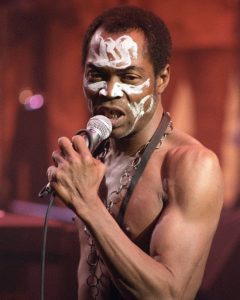London April 2019
From the early 70s quite a number of youths, workers or undergraduates from the few universities and Polytechnics were fixated on Fela and his music. I was one of them. Many of us had listened to Fela’s highlife on radio in the 60s. We used to wonder about the polo-flying trumpeter who played a different highlife music from Olaiya, Rex Lawson, Roy Chicago and Eddie Okonta. We could not make our minds in the early 60s whether we really loved his music, but many of us had respect for his highlife. Olaiya and Rex dominated while Roy Chicago and Eddie Okonta held more promise.
Fela was at the time in highlife pandering to music taste of his “‘I’ve been to’ London” friends and associates who talked about Jazz as the essence and ultimate music. They derided our local African music in the various genre of Sakara, Apala, Ege, Bembe, toy, Agidigbo, Rara, Woro (later called Fuji), and even Juju which was more acceptable and receivable to the Yoruba in Lagos, Abeokuta, Ibadan and the rest.
Fela admirers and audience from the mid-sixties were some of those who had musical training including classical, lawyers, doctors and few graduates of the time. While we looked up to them because we thought they were ‘posh’, Fela’s music did not really catch the younger ones. Then the war came. The absence of Rex Lawson and others created a music vacuum.
Fela left for America with his band, probably thinking he could find fame and money through the musically conscious American audience. Fela’s posh Lagos audience was not bringing the bread and bacon. What happened to him in America was the opposite of what was intended. He was hoping to sell his highlife-Jazz music to the Americans. Instead he got a Saul to Paul biblical conversion. Sandra was one of those people who was used to convert Fela. “You cannot teach us, Americans, any form of Jazz. What we would like to learn if possible from you is African music even in the very raw form”.

Then Fela remembered what his mother told him. “Play the music your people understand”, Mrs Funmilayo Ransome Kuti told her son. Then the Big Bang self discovery happened to Fela. He came back to Nigeria and released ‘Jeun Ko ku’, ‘Iya Iya ta Okun wa le, alu jon jon ki JonJ.
The whole of Lagos youths including the ‘I been to’ opened up to Fela. Fela is playing our music. The music of our ancestors. His Iya, mother indeed ‘ta okun wa le’, Fela took his mother to heaven while other people might have killed their mothers. Closure was put to Koola Lobito. Enter Nigeria 70. End to Kakadu middle class audience. Surulere nite club was tried.
Not enough. Then Fela moved directly in front of his mothers house. Empire Hotel, Moshalashi Road, Yaba was where many musicians reigned. Fela came with an African rebirth and Africa opened up to him. He indeed renamed Empire the African shrine. We gravitated to the shrine unknown to our parents. To many adults the shrine was evil. Bad children, ‘omo buruku’ went to Fela’s shrine. Fela held his audience mostly teenagers or youths to a trance. Most Fridays, Saturdays, Sundays and 2 other days of the week we would gather to listen to Fela’s music. The shrine was packed full. Every year we witnessed Fela reel out music in an unprecedented level of creativity right in our eyes to our pleasure. We kept coming. We became addicted in all ramifications. Then Fela became more bold. He probed and interrogated our Africaness. Ikoyi way Na nonsense. Mushin way Na people. Buy Africa. Na suegbe, Na Pako. Lady. Then he probed and interrogated the government. Trouble sleep, yanga wake am. Perambulator, Monkey dey work, baboon dey chop. He was hounded. He was detained and he was taken to the courts. Then he called his home Kalakuta republic. A sort of affront to the military government. A commune of law unto himself. Hell broke. He sang Zombie, more audacious attack on the military than Alagbon. Hell was let loose. The military destroyed his commune while throwing his mother out of the window. Hell was visited on Fela on earth.
The rest of the story we all know. Musically to me he was the utmost. Politically to me, confusing. I don’t want to be the moral judge. Fela left a musical legacy no one in Africa has met almost 20 years after his death. Eleniyan, continue to sleep well!
Post Views: 2,074